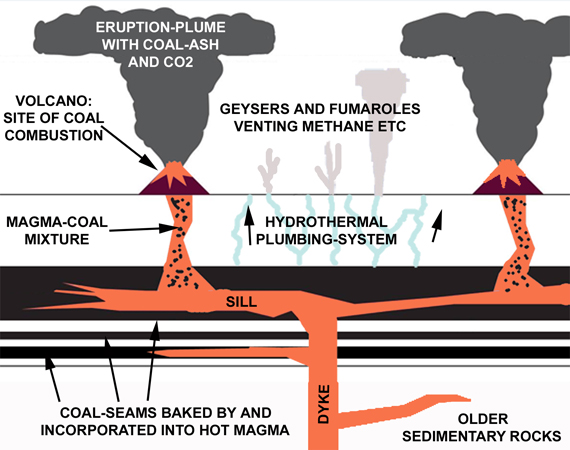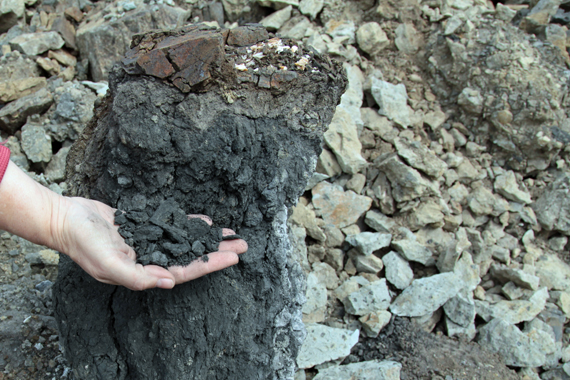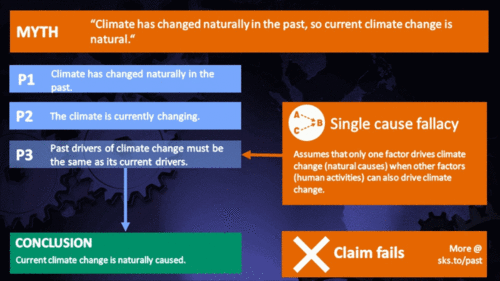What does past climate change tell us about global warming?
What the science says...
| Select a level... |
 Basic
Basic
|
 Intermediate
Intermediate
| |||
|
Greenhouse gasses, principally CO2, have controlled most ancient climate changes. This time around humans are the cause, mainly by our CO2 emissions. |
|||||
Climate Myth...
Climate's changed before
Climate is always changing. We have had ice ages and warmer periods when alligators were found in Spitzbergen. Ice ages have occurred in a hundred thousand year cycle for the last 700 thousand years, and there have been previous periods that appear to have been warmer than the present despite CO2 levels being lower than they are now. More recently, we have had the medieval warm period and the little ice age. (Richard Lindzen)
At a glance
Just imagine for a moment. You fancy having a picnic tomorrow, or you're a farmer needing a dry day to harvest a ripe crop. So naturally, you tune in for a weather-forecast. But what you get is:
“Here is the weather forecast. There will be weather today and tomorrow. Good morning.”
That's a fat lot of use, isn't it? The same applies to, “the climate's changed before”. It's a useless statement. Why? Because it omits details. It doesn't tell you what happened.
Climate has indeed changed in the past with various impacts depending on the speed and type of that change. Such results have included everything from slow changes to ecosystems over millions of years - through to sudden mass-extinctions. Rapid climate change, of the type we're causing through our enormous carbon dioxide emissions, falls into the very dangerous camp. That's because the faster the change, the harder it is for nature to cope. We are part of nature so if it goes down, it takes us with it.
So anyone who dismissively tells you, “the climate has always changed”, either does not know what they are talking about or they are deliberately trying to mislead you.
Please use this form to provide feedback about this new "At a glance" section. Read a more technical version below or dig deeper via the tabs above!
Further Details
Past changes in climate, for which hard evidence is preserved throughout the geological record, have had a number of drivers usually acting in combination. Plate tectonics and volcanism, perturbations in Earth's slow carbon cycle and cyclic changes in Earth's orbit have all played their part. The orbital changes, described by the Milankovitch Cycles, are sufficient to initiate the flips from glacials (when ice-sheets spread over much of Northern Europe and the North American continent) to interglacials (conditions like the past few thousand years) and back – but only with assistance from other climate feedbacks.
The key driver that forces the climate from Hothouse to Icehouse and back is instead the slow carbon cycle. The slow carbon cycle can be regarded as Earth's thermostat. It involves the movement of carbon between vast geological reservoirs and Earth's atmosphere. Reservoirs include the fossil fuels (coal/oil/gas) and limestone (made up of calcium carbonate). They can store the carbon safely over tens of millions of years or more. But such storage systems can be disturbed.
Carbon can be released from such geological reservoirs by a variety of processes. If rocks are uplifted to form mountain ranges, erosion occurs and the rocks are broken down. Metamorphism – changes inflicted on rocks due to high temperatures and pressures – causes some minerals to chemically break down. New minerals are formed but the carbon may be released. Plate tectonic movements are also associated with volcanism that releases carbon from deep inside Earth's mantle. Today it is estimated by the U.S. Geological Survey that the world's volcanoes release between 180 and 440 million tonnes of carbon dioxide per year - as opposed to the ~35 billion tonnes we release.
Epic carbon releases in the geological past
An extreme carbon-releasing mechanism can occur when magma invades a sedimentary basin containing extensive deposits of fossil fuels. Fortunately, this is an infrequent phenomenon. But it has nevertheless happened at times, including an episode 250 million years ago at the end of the Permian Period. In what is now known as Siberia, a vast volcanic plumbing-system became established, within a large sedimentary basin. Strata spanning hundreds of millions of years filled that basin, including many large coal, oil, gas and salt deposits. The copious rising magma encountered these deposits and quite literally cooked them (fig. 1).

Fig. 1: schematic cross section though just a part of the Siberian Traps Large Igneous Province, showing what science has determined was going on back then, at the end of the Permian Period.
Now laden with a heavy payload of gases, boiled out of the fossil fuel deposits, some of the magma carried on up to the surface to be erupted on a massive scale. The eruptions – volcanism on a scale Mankind has never witnessed - produced lavas that cover an area hundreds of kilometres across. Known as the Siberian Traps, because of the distinctive stepped landforms produced by the multiple flows, it has been calculated that the eruptions produced at least three million cubic kilometres of volcanic products. Just for a moment think of Mount St Helens and its cataclysmic May 1980 eruption, captured on film. How many cubic kilometres with that one? Less than ten.
Recently, geologists working in this part of Siberia have found and documented numerous masses of part-combusted coal entrapped in the lavas (Elkins-Tanton et al. 2020; fig. 2). In the same district are abundant mineral deposits formed in large pipes of shattered rock as the boiling waters and gases were driven upwards by the heat from the magma.

Fig. 2: an end-Permian smoking gun? One of countless masses of part-combusted coal enclosed by basalt of the Siberian Traps. Photo: Scott Simper, courtesy of Lindy Elkins-Tanton.
It has been calculated that as a consequence of the Siberian Traps eruptions, between ten trillion and one hundred trillion tons of carbon dioxide were released to the atmosphere over just a few tens of thousands of years. The estimated CO2 emission-rate ranges between 500 and 5000 billion tonnes per century. Pollution from the Siberian Traps eruptions caused rapid global warming and the greatest mass-extinction in the fossil record (Burgess et al, 2017). There are multiple lines of hard geological evidence to support that statement.
We simply break into those ancient carbon reservoirs via opencast or underground mines and oil/gas wells. Through such infrastructure, the ancient carbon is extracted and burned. At what rate? Our current carbon dioxide emissions are not dissimilar to the estimated range for the Siberian Traps eruptions, at more than 3,000 billion tons per century. The warning could not be more clear. Those telling you the climate's changed before are omitting the critical bit – the details. And when you look at the details, it's not always a pretty sight.
Last updated on 14 February 2023 by John Mason. View Archives































 Arguments
Arguments


















































'....It is obviously true that past climate change was caused by natural forcings. However, to argue that this means we can’t cause climate change is like arguing that humans can’t start bushfires because in the past they’ve happened naturally...' is just another absurd comparision.
Comparing a billions of years old eco system and it's natural forcings over eons, to e.g. two neanderthals rubbing two sticks together 10,000 years ago to start a fire, and then accidently starting a bush fire, (proving that even neanderthals had the ability to change the climate!) demonstrates (-snip-).
pcrudy... It's actually a very apt comparison. It's shown over and over in published research that CO2 is the "Biggest Control Knob" (as Dr Richard Alley puts it) for global climate change.
Essentially, what humans are doing is taking that knob, that naturally modulates, and we're turning it rapidly in the warming direction. So, saying that natural climate change precludes humans being able to change climate is fundamentally wrong. And that is the point of the statement.
pcrudy:
The comparison is quite accurate. Arguing that humans can't drive climate change now because humans didn't drive past climate change - in the face of basic physics, backed by empirical evidence, that they can and indeed are - is logically equivalent to arguing that humans can't cause brush fires because they didn't in the past.
The scale of the behaviour being argued is not pertinent.
Another aspect of the "climate has changed before" argument, not covered off in the current answer, is the implication that current climate change should not be considered alarming. "It's changed before, and yet here we are" may be a fair summary of this version.
Is it worth adding some relevant discussion and cross-filing the argument under both the "It's not us" and "It's not bad" taxonomies?
The main responses seem to me to be that a) deep past climate changes were not much fun for living things at the time, being associated with mass extinctions and great upheaval; b) human societies and economies are adapted to the climate they developed in, and so even changes within the range of natural changes of the distant past would be very disruptive; and c) humans now use a very high proportion of potential quality farmland, affordable freshwater and so on to accommodate a large population with high (for many) or rising (for many) living standards; there is not much safety margin to prevent a loss of living standards if climate change erodes availability of some of the resources we depend on.
What was wrong in what Richard Lindzen wrote?
Mark @345 - there's nothing directly wrong with 'the skeptic argument' as articulated by Lindzen here. It's the implication of the statement where the problem lies. Saying 'climate has changed naturally in the past' is like saying 'humans breathe oxygen'. No duh. Everybody knows that. So what's the point in saying it? The answer to that question is pretty clear.
So the "#1 global warming myth" is not really a myth at all...?
Mark, "the climate has changed" before is mostly used to imply that humans arent responsible for current warming and/or that past changes are unforced. As a skeptic argument, it is framed as an excuse to do nothing. In the source where the quote came from, Lindzen tries to touch both bases, along with an a priori assumption that climate sensitivity is low. He has been trying to find some plausible reason for low sensitivity without much success so far. If you want to get down to real myths, then I guess you have to look at what logical step follows from "climate has changed before" but for many, this somehow seems to be enough.
No. There's nothing wrong with the information itself. The myth occurs when the information is voiced--made public. I'd bet you that in 99.99% of the cases in which those facts are strung together and published, the person doing the stringing is attempting to make an implied argument that since climate has changed before without rapid accumulation of atmospheric CO2, and therefore the current climate change is not the result of human CO2 emissions. I've engaged with at least 400-500 people on comment streams using this very implied argument.
So the answer to your first question is "What's wrong is that Lindzen actually wrote it."
In other words, Lindzen thinks you're stupid or at the very least simply ignorant, and willingly so. If you said to him "Duh! What's your point?" he'd probably bluster a little and then show you some really cool graphs.